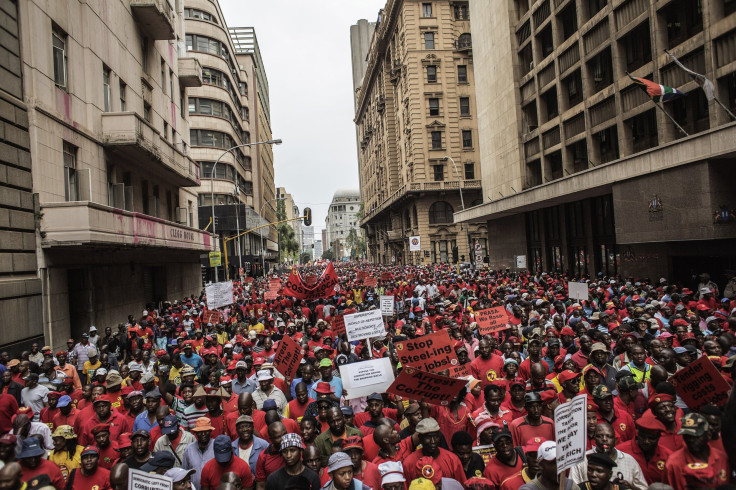South Africa Economy: President Zuma Blames Financial Woes On Global Slowdown, Calls Economic Targets 'A Serious Struggle'

South African President Jacob Zuma on Tuesday blamed the country’s financial woes on the global slowdown and said carrying out his government's blueprint to boost growth and cut unemployment will be “a serious struggle,” according to Bloomberg News. Zuma made the ominous remarks after South Africa’s statistics agency said unemployment rose to 25.5 percent from 25.1 percent in the past three months.
“Certainly, you can’t say when the economy is not growing that your original plans will be implemented as they were,” Zuma, 73, said in an interview Tuesday in the capital city, Pretoria. "There will be an impact, which will mean that in terms of how we meet them, it is going to be a serious struggle.”
The Zuma administration’s National Development Plan aims to spur economic growth to more than 5 percent and to slash the unemployment rate to 14 percent by 2020. It also calls for cutting excessive regulations and a review of South Africa’s labor laws to make it easier for companies to hire and fire employees, according to Bloomberg News.
But Zuma said Tuesday these targets have become unattainable for Africa’s second-largest economy, which is struggling to save jobs amid sinking commodity prices, rising costs and labor unrest. Plunging metal prices have forced mining companies including Lonmin, Impala Platinum and Anglo American Platinum Ltd. to consider firing workers or closing mine shafts, putting 6,000 South African jobs at risk. The mining sector contributes around 7 percent to the economy, according to Reuters.
"It's about jobs, jobs, jobs and none of us should leave this place without committing something to the table," Mining Minister Ngoako Ramatlhodi told reporters in August after holding talks with companies and unions over planned job cuts.
Labor unions, human rights groups and activists of various stripes accuse Zuma's government of being complicit in graft and say the ruling African National Congress party is to blame for South Africa's weakening economy, which contracted an annualized 1.3 percent in the second quarter. The government's auditor-general said state agencies wasted 1.17 billion rand ($85 million) in the year through March last year and incurred 33.6 billion rand in "irregular expenditure," according to Bloomberg News.
Meanwhile, thousands of South African students have called for a freeze on university tuition after university management announced a 10 to 12 percent hike in fees. Police used stun grenades and a water cannon last week to break up a group of students trying to break into government buildings in Pretoria. Zuma, who has been linked to a series of corruption scandals, caved in to their demands Friday, but some demonstrations have continued. Three universities remain closed over the student protests, which are the biggest to hit the country since apartheid ended in 1994, according to BBC News.
“It was clear that if we did not have a solution the demonstrations would have gone further,” Zuma said Tuesday, according to Bloomberg News.
© Copyright IBTimes 2025. All rights reserved.





















